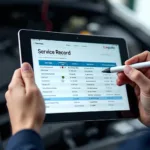The term “CAR” in a police context often leads to confusion. What does CAR stand for in police service? While “car” typically refers to a vehicle, in policing, the acronym CAR can have several meanings depending on the specific context. Understanding these different meanings is crucial for anyone interacting with law enforcement or researching police procedures. This article explores the various full forms of CAR in police service and provides insights into their practical applications. You can find helpful information related to towing services at our zurich car insurance towing service page.
Decoding “CAR” in Police Jargon
The acronym “CAR” doesn’t have one universally accepted full form in police service. Its meaning depends heavily on the specific situation and the department’s internal lingo. This can make understanding police reports and communication challenging for those unfamiliar with these variations. Let’s delve into some of the most common interpretations.
Common Interpretations of CAR
-
Computer-Aided Reporting (CAR): This is arguably the most common full form of CAR in modern policing. It refers to the systems used by officers to document incidents, write reports, and store data electronically. CAR systems streamline administrative tasks and allow for efficient data sharing across departments.
-
Centralized Arrest Records (CAR): This interpretation refers to databases that compile arrest records from various jurisdictions. CAR databases help track an individual’s criminal history, assisting in investigations and risk assessments.
-
Correctional Alternative Resource (CAR): In some regions, CAR might stand for Correctional Alternative Resource. These are programs that offer alternatives to traditional incarceration, such as community service, rehabilitation, or house arrest.
-
Crisis Assessment and Response (CAR): This acronym can also represent specialized teams trained to handle mental health crises and de-escalate situations involving individuals experiencing emotional distress.
How Context Matters: Identifying the Correct Meaning of CAR
Determining the intended meaning of CAR requires careful consideration of the context. Pay attention to the surrounding words and the overall topic of discussion. For example, if the conversation revolves around technology and data management, CAR likely refers to Computer-Aided Reporting. If the discussion is about rehabilitation programs, CAR might stand for Correctional Alternative Resource.
The Importance of Understanding Police Acronyms
Understanding police acronyms like CAR is vital for several reasons. It facilitates clear communication between law enforcement and the public, aids in interpreting police reports and documentation, and helps researchers and journalists accurately portray police procedures.
Beyond CAR: Other Common Police Acronyms
Besides CAR, numerous other acronyms are frequently used in police communications and documentation. Familiarizing yourself with these acronyms can enhance your understanding of police procedures. Some common examples include:
- BOLO (Be On the Lookout): A broadcast alert for a suspect or vehicle.
- APB (All-Points Bulletin): Similar to BOLO, but typically more widespread.
- DOA (Dead On Arrival): Used to indicate a fatality at a crime scene.
- ETA (Estimated Time of Arrival): Used for coordinating responses.
Full Form of CAR in Specialized Units
In specialized units like SWAT or K9, CAR might have entirely different meanings specific to their operations. This further underscores the importance of understanding context when interpreting police acronyms.
Conclusion: Deciphering the Mystery of CAR
The Full Form Of Car In Police Service varies depending on the context. While Computer-Aided Reporting is the most common interpretation, other meanings exist and should be considered. Understanding these variations is crucial for clear communication and accurate interpretation of police information. By paying attention to the surrounding context and familiarizing yourself with common police acronyms, you can better navigate the intricacies of police jargon. If you need assistance with any car-related issues, feel free to contact our 24/7 support team via WhatsApp: +1(641)206-8880 or Email: [email protected].
FAQ
- What is the most common full form of CAR in policing? Computer-Aided Reporting.
- Why is understanding police acronyms important? It facilitates clear communication and accurate interpretation of police information.
- Does CAR always stand for Computer-Aided Reporting? No, it can have other meanings depending on the context.
- What are some other common police acronyms? BOLO, APB, DOA, ETA.
- How can I determine the correct meaning of CAR? Consider the surrounding words and the overall topic of discussion.
- Are there specialized meanings of CAR in specific police units? Yes, some specialized units might have their own interpretations of CAR.
- Where can I find more information about car services? Consider our zurich car insurance towing service page.
Scenarios illustrating questions about “CAR”
- Scenario 1: A journalist reviewing a police report encounters the term “CAR system malfunction.” In this context, CAR likely refers to Computer-Aided Reporting.
- Scenario 2: A social worker discussing alternative sentencing options mentions “CAR programs.” Here, CAR likely stands for Correctional Alternative Resource.
- Scenario 3: A police officer requests backup for a “CAR situation” involving a distressed individual. In this case, CAR might stand for Crisis Assessment and Response.
Related articles and questions:
- What other technology is used in modern police work?
- How are police reports filed and accessed?
- What are the different types of police units and their functions?
Don’t hesitate to contact us via WhatsApp: +1(641)206-8880, Email: [email protected]. Our 24/7 customer support team is always ready to assist you.
